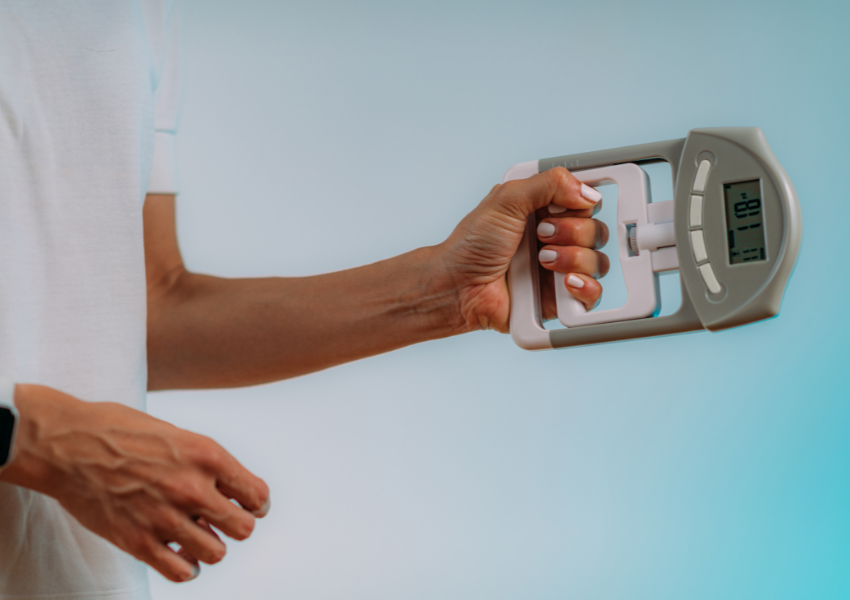GRIP STRENGTH ASSESSMENT IN MADISON, WISCONSIN
Grip Your Health, Strengthen Your Future
Grip strength is a vital marker of overall health and longevity. A Handgrip Strength Test measures your muscle strength, tracks your progress, and supports your fitness goals.
Discover Your Grip Strength & Muscle Quality
Your grip strength reveals more than just hand power—it reflects your overall muscle function and well-being.
Studies connect grip strength to total body strength, heart health, and even longevity. Our cutting-edge Grip Strength test at DexaFit Madison delivers precise insights to help you optimize your fitness and health.
A Clear Picture of Your Strength & Well-Being
Our quick and precise test measures your grip strength, offering a clear understanding of your current ability and areas to enhance. Whether you're recovering, training, or simply focused on maintaining your fitness, this assessment provides valuable data to support your health and performance goals.
Why Grip Strength Matters
Measure Muscle Strength – This test evaluates your hand and forearm strength, offering insights into overall muscular health.
Boost Athletic Performance – Whether you're a competitive athlete or a weekend warrior, understanding your grip strength can help refine your training.
Monitor Progress – Track changes over time to adjust your workouts and optimize results.
Detect Imbalances & Weaknesses – Assess each hand’s strength individually to uncover and address any discrepancies.
Your Health & Grip Strength
Your grip strength isn’t just about muscle—it reflects your overall health. Studies have found that weaker grip strength is linked to a higher likelihood of heart disease, mobility issues, and even a shorter lifespan.
Research indicates that a 5-kilogram decline in grip strength corresponds to a 16% increase in the risk of death within four years.
The best choice for grip
strength testing in Madison
"Not enough can be said about the importance of grip strength as you age. It’s one of the strongest physical associations with longer life."
— DR. PETER ATTIA
Author of Outlive: The Science and Art of Longevity
3 Easy Steps to Grip Strength
Step 1: Effortless Assessment
Experience our advanced assessment to gain detailed insights into your grip strength and overall muscle health
Step 2: Get instant results
No delays, no downtime – just insights and our expertise at your fingertips, ready to explore and leverage
Step 3: Expert guidance
Gain clarity, not just data. Our thorough review of your results ensures you are empowered to act on your new insights

FAQs
-
The handgrip strength test is a simple and non-invasive assessment that measures the maximum isometric strength of the hand and forearm muscles.
Grip strength is a fundamental gauge of overall health that extends beyond mere hand and forearm power. It serves as an essential indicator of functional capacity, revealing insights into an individual's musculoskeletal health and greater bodily resilience.
Beyond its medical implications, grip strength is crucial in daily activities, affecting everything from carrying groceries to performing exercise routines.
It is especially significant as we age, as diminished grip strength can signify muscle loss and may lead to increased frailty, mobility issues, and a greater risk of falls. By regularly assessing grip strength, individuals can take proactive measures to maintain their muscular health, thus promoting overall well-being and longevity.
-
A good hand grip strength varies depending on age, gender, and overall health. Generally, men tend to have stronger grips than women, and grip strength tends to decline with age.
On average, a healthy adult male will have a grip strength of around 105-125 pounds, while a healthy adult female would have an average grip strength of around 60-80 pounds.
However, it is essential to note that these are just general guidelines, and individual results may vary based on several factors.
-
DexaFit uses a state-of-the-art dynamometer that has been scientifically validated for accuracy. The test results are also compared to normative data based on age, gender, and body size for more precise interpretation.
-
The frequency of getting your grip strength tested may vary depending on your specific health and fitness goals. Generally, it is recommended to get tested every 6-12 months to track progress and make necessary adjustments to your training routine.
However, individuals recovering from an injury or participating in sports may benefit from more frequent testing.
-
Yes, grip strength can be improved through targeted exercises and proper nutrition. If you have identified areas for improvement through a handgrip strength test, our team at DexaFit can provide personalized recommendations and guidance to help you reach your goals.
Additionally, tracking your progress through regular testing can also help motivate and support continued improvements in grip strength over time.






